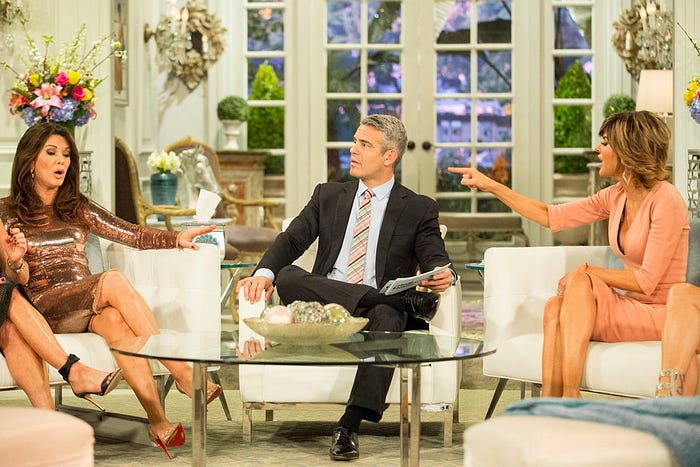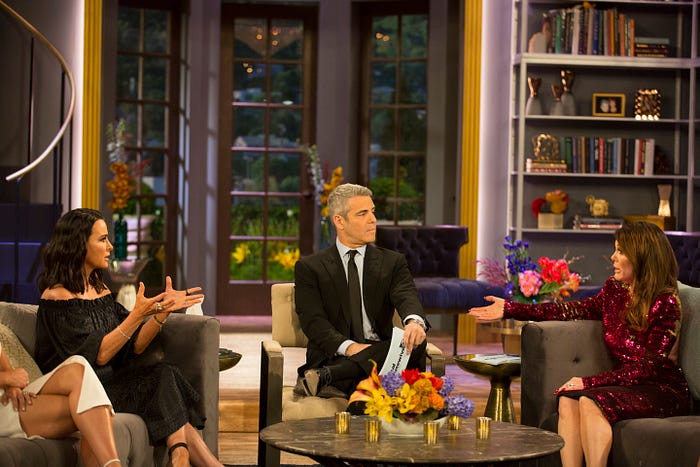

Five lessons I’ve learned about social norms from watching eleven seasons of The...
source link: https://medium.com/@robin_lobbe/five-lessons-ive-learned-about-social-norms-from-watching-eleven-seasons-of-the-real-housewives-of-b45716703cb3
Go to the source link to view the article. You can view the picture content, updated content and better typesetting reading experience. If the link is broken, please click the button below to view the snapshot at that time.
Five lessons I’ve learned about social norms from watching eleven seasons of The Real Housewives of Beverly Hills (Part 1)
The hidden facts Reality TV reveals about social relationships

What is right and what is wrong. This is the main topic of discussion in the show. The housewives love to express indignation and outrage. Photo from NBCUniversal.com, Bravo TV
I think it is safe to say that many people believe that nothing philosophically interesting can be learned from watching reality TV. For example, I have never come across a philosophy paper that uses reality shows as illustrations of an argument or theory.
I used to be one of these academics. I thought that reality TV is superficial, boring, and, ironically perhaps, detached from reality — at least my reality. That has changed after watching 11 seasons of The Real Housewives of Beverly Hills.
The Real Housewives of Beverly Hills is a TV show about more or less six women (the cast varies between seasons) that regularly meet up to discuss their mostly arranged friendships in front of a seemingly invisible camera. Interestingly, while they all live in Beverly Hills (this part is true), they are not really housewives. In fact, most of them are busy business women and mothers who spend their time traveling the world.
While, at first, my partner had to force me to watch the show, I eventually noticed something that I was able to relate to a lot of recent research in philosophy, especially work in moral philosophy. This is when I realized that the entire show is built around what philosophers call normativity, particularly interpersonal normativity, i.e., normativity that involves our relationships with others.
In the following, I summarize five lessons I have learned about this topic of interpersonal normativity from watching eleven seasons of The Real Housewives of Beverly Hills.
By the way, much of what I am about to say does not presuppose any familiarity with the show or the characters even though I engage in a lot of namedropping.
Lesson 1: We care about normativity — a lot!
Normativity is an ambitious word and I do not claim to discuss or introduce it here in all its depths and details. For my purpose, it suffices to say that normativity has to do with dos and don’ts. Whenever there is something that you should or should not do, you are entering the realm of normativity. Whenever someone tells you what you are doing is wrong (or right), whenever they criticize or praise you, they are making normative statements.
For example, when Kyle Richards tells Lisa Rinna that she should not question whether Yolanda Hadid has Lyme disease, Kyle is saying that Rinna should trust her friend. When Kim Richards criticizes Brandi Glanville for bringing up Kim’s potential alcoholism, she is making a normative statement about how Brandi should act around her.
What changed my perception of the show is that The Real Housewives of Beverly Hills is about little else but normativity. The entire show consists of little more than endless debates on what another housewife should or should not have done. At the end of each season, the participants even get together in a kind of group-therapeutical debriefing session called “Reunion”.
During reunions, all the controversies are brought to life again and everyone gets the chance to justify their actions to the other housewives.
Seriously, if you do not want to watch an entire season, watch these final group sessions. They are genuinely funny. For example, in one of those debriefing sessions, Dorit Kemsley finally had the chance to set the record straight. She was finally able to sincerely apologize to Erika Jayne for creating the “Pantygate feud”. An opportunity which she, being Dorit, obviously missed out on. Her apology was not considered sincere. And “Pantygate” continued.
So, normativity is apparently something that a lot of people really care about. A lot. On average, every episode of the last season had around one million viewers when it aired. They care so much about normativity that, at least in the case of me and my partner, they are willing to watch 244 episodes of about 45 minutes each to see strangers talk about it. This is almost 11.000 minutes of pure and unashamed normativity in the wild!
Remember that a day has not more than 1440 precious minutes. This means that during the last Covid curfew, my partner and I watched almost 8 full days of what I call normativity TV.
What is even more fascinating is that we find it brainless, mind-numbing, and relaxing to watch people talk about normativity. If you are like us, you don’t watch the housewives because if you seek an intellectual challenge. You watch it after work when you just want to relax and escape reality. Then, ironically, you watch reality TV. When you want to go to sleep and need someone to tell you a goodnight story. This is when we watch “The Housewives”.
This means that ordinary people — and not just philosophers — watch and discuss shows about normativity to relax. What kind of animal are we that we watch normativity TV to relax?

It’s weird, but it seems normativity is the only thing the housewives really care about! Photo from NBCUniversal.com, Bravo TV
Lesson 2: We care mostly about a certain kind of normativity: social normativity
Philosophers have historically been mostly interested in a rather limited kind of normativity that we might call moral norms. More recently, however, philosophers have developed an interest for another kinds of norm, what philosopher Cristina Bicchieri calls “social norms”. What exactly are social norms? Philosophers like Bicchieri sometimes distinguish social norms from mere conventions.
Conventions are often understood as arbitrary rules that essentially prevent us from bumping into each other (at least according to an understanding championed by philosopher David Lewis). They are rules that solve coordination problems. Examples include driving on the left or right side of the road or calling cats ‘cats’, as opposed to ‘les chats’ or ‘die Katzen’, as the French and Germans do.
The interesting aspect about conventions is that nobody really thinks that one solution to a coordination problem is better than another. Nobody really thinks that driving on the right side is inherently better than driving on the left side of the road. Nobody really thinks that saying ‘le chat’ when seeing a cat is inherently better than saying ‘the cat’. The only important thing about conventions is that everyone follows them. If this is the case, nobody in society has any good reason not to follow them.
Social norms are different from conventions in this sense. They are a bit like moral norms but perhaps less about evil stuff like slaughtering puppies or finishing your flatmate’s coffee without replacing it. In the case of social norms, we think that people should do certain things because they are among the better solutions to a problem, at least for our society or group. We think that one rule can be better than another even if both would equally well generate coordination.
For example, Italians do not think that adding Ketchup to pasta is simply one way of doing things that is not necessarily better than making a proper Italian tomato sauce. Many Italians think that eating pasta with Ketchup is literally wrong even if they probably don’t consider it evil or a crime. Eating Ketchup with pasta for many Italians is against a social norm and violating this norm entitles others to criticize you, at least when around other Italians.
The distinction between mere conventions, social norms, and moral norms is apparent in the housewives. Whenever they discuss their problems with each other, they hardly ever imply that the behavior they criticize is evil or immoral. They also do not really complain about violations of mere conventions. Still, they believe that some actions are truly wrong in some other — merely social — sense.
For example, when Denise Richards shows up in shorts for brunch, the others do not judge this as a mere failure in coordination about what to wear. However, they would also not think that this was necessarily immoral or criminal. Still, they think it was wrong in a more social interpersonal way pertaining to their own peculiar social norms rather than legal or moral norms that they think everyone ought to follow because it is morally required.
Similarly, maybe some of you remember when Dorit was engaging in non-consensual cuddling with Lisa Vanderpump on Kyle’s couch –apparently as a form of apology? This was one of the most cringeworthy moments of the season. The other housewives thought that Dorit acted wrongly and made their disagreement and indignation with Dorit’s action very explicit. Still, they would probably not think that Dorit did something morally wrong or that she merely violated an arbitrary convention.
Lesson 3: We usually share a lot of normative common ground
We often think that our social norms are at least one of the better ones. Still, they are not always obvious to everyone, and every society has social norms that other societies do not have. Not every culture has a norm for how to eat one’s pasta, for example. Most Germans or Americans find it completely acceptable to add Ketchup to a pasta dish. Again, many Italians will respond with indignation and disgust. Many Germans and Americans don’t know this rule, which may lead to problems when visiting Italy.
So, a third observation I take to be fascinating about The Real Housewives of Beverly Hills is that there always tends to be a lot of normative common ground, i.e., shared beliefs about what is or is not acceptable in the group.
Here is a small selection:
- Friends have each other’s back.
- Do not act too drunk.
- Do not act too sober either.
- Do not talk behind your friend’s back.
- Do not talk negatively about a housewife's children.
- Compliment each other’s parenting.
- Do not lie.
- But don’t be too honest either.
- Smile.
- Don’t smile too much (be authentic).
These are all social norms of friendship (some of which are also moral norms) that all housewives never explicitly agreed on but that are presupposed by everyone who has ever been in the show (even if these rules are constantly broken).
Even if we do not agree with all of our social norms, we are often very glad these social norms exist. This is because they tell us how we can act in ways that are acceptable to others. In other words, our normative common ground structures all our joint activities because they determine what is ok to do and what is not ok to do.
I may not like the rule that one must wait for the others to have their food before one can start eating, but I still value it for signaling when it is ok to start eating. Having no rule at all generates too many awkward moments at the kitchen table.

The housewives love to point out norm violations but they rarely discuss which norms to follow. They usually take their social norms for granted. Photo from NBCUniversal.com, Bravo TV
Lesson 4: There is normally little meta-normative debate on which norms to follow
What fascinated me even more when watching the show was how little debate there is about what norms to follow. The housewives rarely discuss what to wear for breakfast or why it should be a violation of a norm if someone decides to come in shorts. They never sit down together to decide what level of drinking is allowed in the group and at what point drinking becomes a norm violation.
Similarly, in ordinary life as well as in the show, there is usually surprisingly little debate on whether the many rules the housewives base their normative reasoning on are really justified. In other words, another striking fact about the housewives as well as ordinary life is that there is little meta-normative debate on which social rules should be followed.
This is surprising because the housewives do not all come from the same background and are in fact sometimes complete strangers to one another when entering the show, this leads me to the following question: how did the housewives get their social norms if this is such an important part of their lives and the show? How did they converge on the same dos and don’ts?
Lesson 5: Social norms are usually established implicitly
The simple answer to the question of how the housewives converged on the same social norms is that most of them are rather basic norms of friendship. They are all rather basic rules that most of us probably share.
This is probably also one reason we find the show so relaxing to watch. There is no real challenge to our most central world views. There are no empirical facts that some of us may not have learned about at school. Most of us probably believe that these norms make a lot of sense.
Still, even though many of the core norms of friendship in the show are rather universal, at least in the West, other rules are less universal, and still, the housewives hardly ever discuss what rules are better than others.
Take the rule that we do not really speak negatively about another housewife’s husband on TV. This rule is not obvious. Perhaps one might expect that husbands are a frequent and popular topic among housewives in Beverly Hills.
This is not the case in the show where the rule is incredibly strict and broken so seldom that the show is one of those rare exceptions on TV that easily meet the Bechdel Test. In those rare instances when it is broken, it is immediately sanctioned by criticism and gossip.
The rule also makes sense. We do not want to air dirty laundry and affect other people who are not in the show directly. Still, one might ask how the housewives converged on this rule. Who decided that this would be a rule?
Of course, some rules were probably established in a kind of contract or more informal agreements before any participant enters the show. Maybe the rule not to talk about family members is one such rule. This is a possibility although the housewives talk too often too negatively about husbands for it to be true. I believe that the real story is more interesting.
Often rules are established implicitly by means of criticism of an action. In order for this complaint to establish a rule, the person criticizing must either be socially authoritative (like Kyle Richards or Lisa Vanderpump), or the rule must be inherently useful, a fact which must be accepted by most.
I remember that very early in the show, Kyle made this rule rather clear by expressing indignation whenever another housewife would start saying anything negative about her husband Mauricio Umansky. After this, there would be very little that was said about him. Kyle, having the proper authority, thus implicitly established a rather strict rule. This rule now entitles everyone to criticize those who break this rule, as “hitting below the belt” or as employing a dirty strategy to deflect.
Similarly, in one seminal episode, Kim Richards suggested that Lisa Rinna’s husband might have a drug addiction to deflect from Rinna’s accusations of Kim being an alcoholic. Rinna thought that this is unfair and below the belt, which motivated her to basically flip out and throw a glass of wine at Kim.
Most housewives disagreed with Rinna’s action, but it was largely considered justified by the fact that Kim had made an unfair insinuation about her husband. Kim broke a more central norm than Rinna.
So, what have I learned from watching 8 full days of The Real Housewives of Beverly Hills?
I have learned that the real housewives of Beverly Hills are not that different from us. Sure, they care a lot about expensive houses, cars, and body parts. They care about expensive clothes, gadgets, and tiny pink ponies you can’t ride. But really, what they really deeply care about is normativity. Normativity is everywhere.
It is the dark matter that prevents a group of individuals from spinning around like unruly planets. It is what makes friendship possible and valuable. It is like gravity but better. It is more fundamental. Gravity is what keeps us physically grounded. Normativity is what made groups of scientists discover gravity possible in the first place. It prevents us from drifting apart from one another and we could not have a single conversation without it.
And this is what the producers of the show and reality TV more generally have understood and brought to our attention. They present us with deep social truths about our social lives and all we need to do is recognize them whenever they shine through the pink and blonde façade of The Real Housewives of Beverly Hills.
And this is what I have learned from watching 11 seasons of The Real Housewives of Beverly Hills.
Recommend
About Joyk
Aggregate valuable and interesting links.
Joyk means Joy of geeK